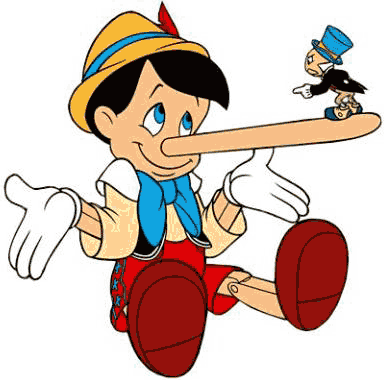People lie and they always have and they always will. Abraham Lincoln once said, “you can fool some of the people all of the time, and all of the people some of the time, but you cannot fool all of the people all of the time.”
Given the current news for the past week and probably for upcoming weeks as well, I thought taking a glimpse into some of the language that English speakers use for lying or falsehoods might be interesting and beneficial.
I had originally intended to cover both lies and truth in this post. Sadly, in my initial search of “lie idioms,” I easily and quickly found 20 idioms that are used today on a regular basis! I was actually aghast that we had so many was to discuss lying! And that doesn’t even include the many awesome “truth idioms” in English. However, that much language is a little beyond the scope of one short blog. There were so many that I had to categorize them! I’m only going to cover two categories of lie idioms in this post, but, who knows, maybe I’ll put the rest in a slide share lesson. I’m also going to include a few idioms of truth to remind myself and the world that telling the truth does still occur in America today.
So without further ado let’s examine the English language of lies and truth.

Alternative Facts
English is always changing, which is both exciting and frustrating for language learners. Case in point, we have a brand-new idiomatic phrase put out last week by the Trump administration for the word lie. The new American phrase for lie is “alternative facts.” This idiom, having just been created, is still in the process of being defined and you can read a plethora of news articles simply by googling it. According to some, it is defined as explaining the evidence to be what one hopes for rather than what actually exists; for others, it’s defined as a lie.
Here are some other idiomatic phrases for lies.

False Pretenses
This is a kind of lie that occurs more as actions than words so can be defined as an activity occurring when something is represented as one thing when it’s actually another. For example, if a married man were to ask a woman on a date, he would be doing so under false pretenses since he’s not free to date as a married person.

White Lie
The final kind of lie is a small insignificant lie, the white lie. These lies are often told out of kindness. For example, we might say someone looks great today when in reality she just looks ok.
Pack of Lies
This phrase is used when many lies get bundled together in a pack. For example, how can you believe anything he says when everything is a pack of lies?

Barefaced,
Bald-faced,
or Bold-faced Lie
These three are all similar phrases for the same thing, a whooper of a lie, and can be used to describe both the lie or the liar. Whichever one uses, the meaning is the same – an outrageous or audacious statement of untruth. One simply has to look in a current American news article to find some of those examples.

If you just looked at the English language (and our politicians), you would think we were a nation of liars. For the record, not everyone is.
Some of us still the believe in truth.
Nonetheless, we have various intriguing idiomatic ways to express telling a lie. Here are some of the more fun ways to express telling a lie, giving a falsehood, or speaking dishonestly:
Lying Through One’s Teeth
Lead Up the Garden Path
Pull a Fast One
Take For a Ride
Spin a Yarn
Stretch or Bend the Truth

Truth will have its day!!
Sooner or later, no matter how good the lie, there will always be a “moment of truth,” when the lie is revealed in the “unvarnished truth” or “naked truth,” both of which mean basic unavoidable truth.






